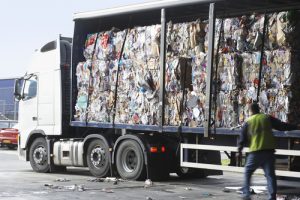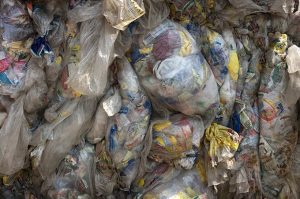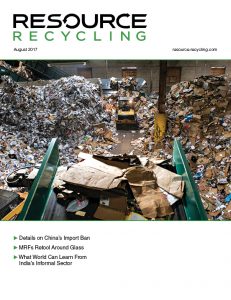 Readers last month were drawn to stories covering the various market and program impacts of China’s import restrictions.
Readers last month were drawn to stories covering the various market and program impacts of China’s import restrictions.
Features from the August 2017 print edition:
- Buying in
- Community Spotlight: How one SoCal beach town takes on diversion challenges
- Data Corner: How the US and EU stack up on pricing
- In My Opinion: Bringing nuance to the numbers
- MRF of the Month: Eureka Recycling, Minneapolis
- Picking dignity
- Step by step
Subscribe today for access to all print content.


 Two beverage companies accept grants for recycling and sustainability efforts, and Oregon helps make expanded polystyrene recycling viable in a rural county.
Two beverage companies accept grants for recycling and sustainability efforts, and Oregon helps make expanded polystyrene recycling viable in a rural county. More cities begin curbside collection of food-service packaging, and a municipal program offers refunds to customers after recycling loads are sent to the local landfill.
More cities begin curbside collection of food-service packaging, and a municipal program offers refunds to customers after recycling loads are sent to the local landfill. China’s ban on imports continued to draw readers’ interest last month, along with stories about Walmart and shifts in measuring recycling success.
China’s ban on imports continued to draw readers’ interest last month, along with stories about Walmart and shifts in measuring recycling success. When it made landfall on Aug. 25, Hurricane Harvey became the wettest tropical cyclone to ever hit the U.S., dumping more than five feet of water on Houston. The resulting floods have impacted the recycling industry in multiple ways, driving up prices for virgin plastics, hampering freight systems and halting curbside collections.
When it made landfall on Aug. 25, Hurricane Harvey became the wettest tropical cyclone to ever hit the U.S., dumping more than five feet of water on Houston. The resulting floods have impacted the recycling industry in multiple ways, driving up prices for virgin plastics, hampering freight systems and halting curbside collections. One report indicates that buyers in China are desperately seeking domestic sources of recovered paper. Meanwhile, low-value plastics are flooding the European market, but processors there have limited ability to handle those loads.
One report indicates that buyers in China are desperately seeking domestic sources of recovered paper. Meanwhile, low-value plastics are flooding the European market, but processors there have limited ability to handle those loads.